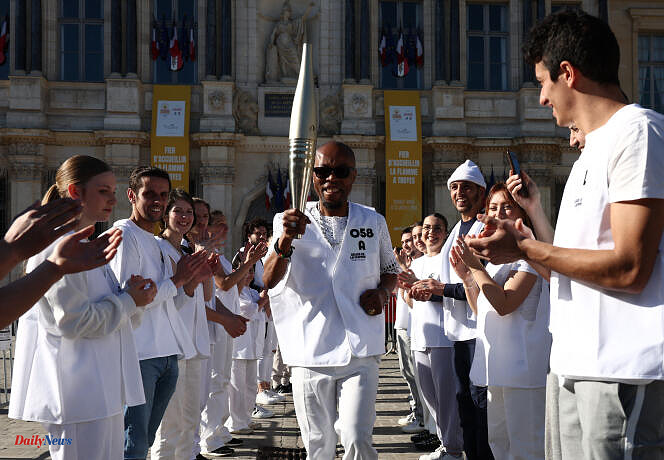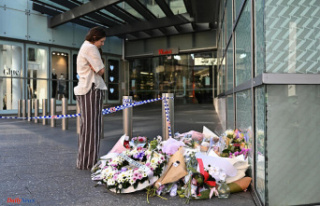The Games before the Games. In Olympia, on the remains of the temple of the marriage goddess Hera, the sun's rays will light the Olympic flame on Tuesday April 16 (at 12 p.m. local time, 11 a.m. in France). The torch, brandished by the Greek actress Mary Mina, will be taken to the ancient stadium where it will be handed over to the first torchbearer, the Greek Stefanos Ntouskos, Olympic rowing champion in Tokyo in 2021. It is then the swimmer Laure Manaudou – Olympic champion in the 400m freestyle at the Athens Games in 2004 – who will succeed her.
This ritual marks the start of an eleven-day procession in Greece which will end with a handover ceremony at the Panathenaic Stadium in Athens, where the modern Games were born. Then the Olympic fire will board the Belem, the only survivor of the French three-masted ships, and head for Marseille, a city founded by Greeks from Phocaea in 600 BC. AD The ancient heritage of the XXXIII Olympiad is assured.
In the harbor of Marseille, the Belem – launched in 1896, the year of the first modern Olympic Games (OG) – should be surrounded by a thousand boats before entering the Old Port on Wednesday May 8. In front of 150,000 expected spectators and under the eyes of the world, a first bearer, whose identity will be known at the last moment, will unload the torch, the result of Mathieu Lehaneur's design and the production lines of ArcelorMittal, before a cauldron Olympic (installation planned in each stage city, not to be confused with the cauldron) is set ablaze.
The flame will visit 64 overseas departments and territories, stop in 65 host cities, pass through more than 400 municipalities and its relay will mobilize some 10,000 bearers. Its route is intended to be a showcase of France, highlighting its history (Lascaux cave, Verdun, D-Day beaches, etc.), its architectural masterpieces, its landscapes (Mont-Saint-Michel, Mont-Blanc massif, viaduct de Millau…), its historical figures (Charles de Gaulle in Colombey-les-Deux-Eglises, Joan of Arc in Orléans…) and its sporting sites (Simonne-Mathieu court at Roland-Garros, Mont Ventoux, Teahupoo…). “It is truly France in all its great diversity that will be present on the relay,” says Grégory Murac, delegated director of the torch relay within the Organizing Committee of the Olympic and Paralympic Games (Cojop).
180,000 euros per department
The torch relay is “a festive and unifying moment,” summarizes Eric Monnin, vice-president of the University of Franche-Comté in charge of the Olympics and director of the university Olympic study and research center. But “a moment” that has a price. As early as February 2022, Creuse had announced that “the Olympic flame will not come [for] a cost problem”. To host the relay for one day, it costs 180,000 euros, taxes included. Not to mention the burden borne by each municipality visited (activities, security, etc.).
These additional expenses were criticized by Morgan Berger, mayor of Cognac (Charente), where the flame is expected on May 24. Until the end of March, the councilor assured that he was missing between 8,000 and 9,000 euros to ensure the event and, unable to raise the sum, he threatened to give up hosting the relay. Finally, a solution was found.
If the Cojop boasts a flame which “will light up all territories”, certain departments will not see the glow, particularly because of this bill considered too high. However, cities wishing to host the Olympic fire found the solution: Montpellier, for example, joined forces with Sète and Millau, while Hérault and Aveyron had refused to be candidates. Same operation in Loire-Atlantique, where the department refused the flame, but where seven towns incurred the costs to host the relay.
“Safety bubble”
Subject to political tensions, the flame can also be the subject of threats. Around the bearer, eighteen police officers and gendarmes on foot and in civilian clothes will be mobilized. The national gendarmerie intervention group (GIGN) and mobile force units will complete the “security bubble”, as well as a drone jamming vehicle. These security measures will cost the State 1 million euros.
At the end of January, Gérald Darmanin considered that, in addition to the terrorist risk, the main threat of disruption emanated from “ultra-left environmentalist” collectives. “Each route of the flame will have an alternative route,” declared the Minister of the Interior in an interview with Le Parisien on April 9, adding that “we have also made arrangements with the broadcasters so that they can follow plans B if applicable.”
For the Paralympic Games (from August 28 to September 8), “the same project and the same ambition” as for the Olympic Games will prevail regarding the relay of their flames (twelve, unlike the single Olympic fire), according to Cojop. But the route will be more modest: lit in Stoke Mandeville (England), cradle of the Paralympic Games, on August 25, the Paralympic procession will reach Paris in four days.












